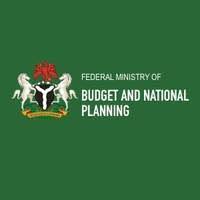Nigeria requires $2.3trillion investment over the next 23 years to bridge its infrastructure deficit, the Federal Government has stated.
The Federal Government made this known during the visit of the United Kingdom Nigeria Infrastructure Advisory Facility (UK-NIAF) to the Minister of Budget and National Planning, Sen. Atiku Bagudu yesterday in Abuja.

The Ministry appealed to the UK-NIAF to assist in providing support to the Ministry to host national and sub-national awareness and sensitisation workshops on the Reviewed National Integrated Infrastructure Master Plan (2020-2043) as the FG-approved vehicle to deliver infrastructure projects in Nigeria.

The support, it said, was very important and urgent in view of the new political dispensation and to avoid duplication of efforts.
The Director of the Infrastructure Department of the Ministry, Samuel Nwozuzu, who addressed the visitors said there was also a need for awareness creation by the Minister at the Federal Executive Council and at the National Economic Council on the existence of NIIMP, which is the vehicle for infrastructure project delivery in Nigeria.
He noted that the limited capacity of the MDAs in the identification and packaging of bankable projects still remains an obstacle to infrastructure delivery in Nigeria as it has limited private sector investment in infrastructure development.

He therefore urged NIAF to assist in strengthening institution capacity of the Ministry and other relevant MDAs to achieve that purpose.
The Director also called on the NIAF to provide technical and financial support to develop 2023-2027 NIIMP Implementation Plan which, he said is still outstanding.
He further requested the partners to provide capacity and other form of assistance to States and FCT to develop the States Integrated Infrastructure Master Plan in line with the States priorities and align it with the National objectives in other to ensure seamless effort in Infrastructure planning.
The UK-NIAF visit was a follow up to the visit of the UK Foreign Secretary to Mr. President on how to work with the Federal government to support the vision for infrastructure delivery which is a critical driver of economic growth and overall development.
In the past, the NIAF has assisted the Federal and State Governments in the areas of capacity building for MDAs in the areas of Public Private Partnership in projects development as well as assistance in mobilising about USD600 million in grants and concessionary funding for a number of critical infrastructure projects among others.
It has also worked with a range of Federal and selected Sub-National MDAs to develop a decision support tool which the Budget Office of the Federation has adopted to green the project pipelines of infrastructure-focused MDAs in the 2023 Appropriation Act and develop a USD 7.2 billion pipeline of climate-smart infrastructure projects, among others.
The UK-NIAF was established by the UK Department for International Development (DFID) in response to a request made by the Federal Government for support in the provision of technical assistance to enable the country to improve its infrastructure, the quality and reliability of related services.
The goal of the NAIF is to increase access to improved, reliable and affordable infrastructure services in Nigeria via enhancing governments capacity to plan, finance and operate infrastructure delivery at the federal and state levels.
NAIF has a broader aim to improve availability of finance for infrastructure development in particular through public private partnership (PPP) in infrastructure.
Recall that Nigeria already has a Master Plan on Infrastructure, the National Integrated Infrastructure Master Plan (NIIMP), which was developed in 2014 through a participatory process involving all relevant stakeholders.
The NIIMP provides an integrated view of infrastructure development in Nigeria, with clear linkages across key sectors and establishes sector targets, priority programmes and critical enablers for effective implementation.
As at 2020 when the NIIMP was reviewed, it was estimated that Nigeria will require an investment of USD 2.3 trillion over the next 23 years from 2021 to raise the stock of infrastructure from 30 percent of Gross Domestic Product (GDP) to at least 70 per cent by 2043.
To meet this target, the sum of USD 150 billion is required annually from 2022 to 2027.
The Public sector is to provide 48 per cent of the funds required, while the private sector provides 52 per cent.
This is quite huge in view of the lean public sectors resources it is believed that the implementation of the Reviewed NIIMP and the National Development Plan will therefore be heavily dependent on a strong partnership between the private and public sectors.
This, experts say, will require great emphasis by Federal government and States on Public Private Partnership as a vehicle to bridge the infrastructure funding gap.

